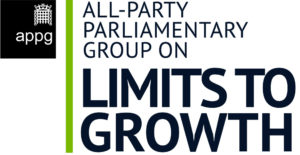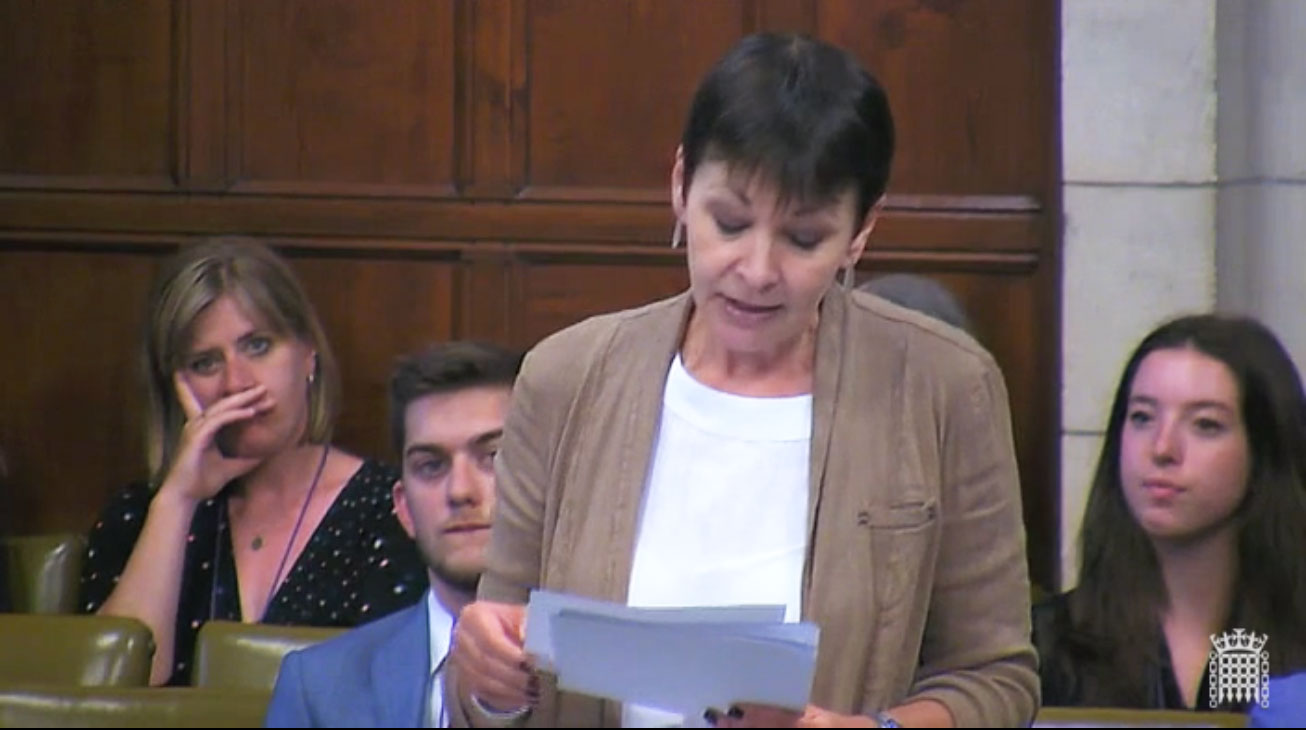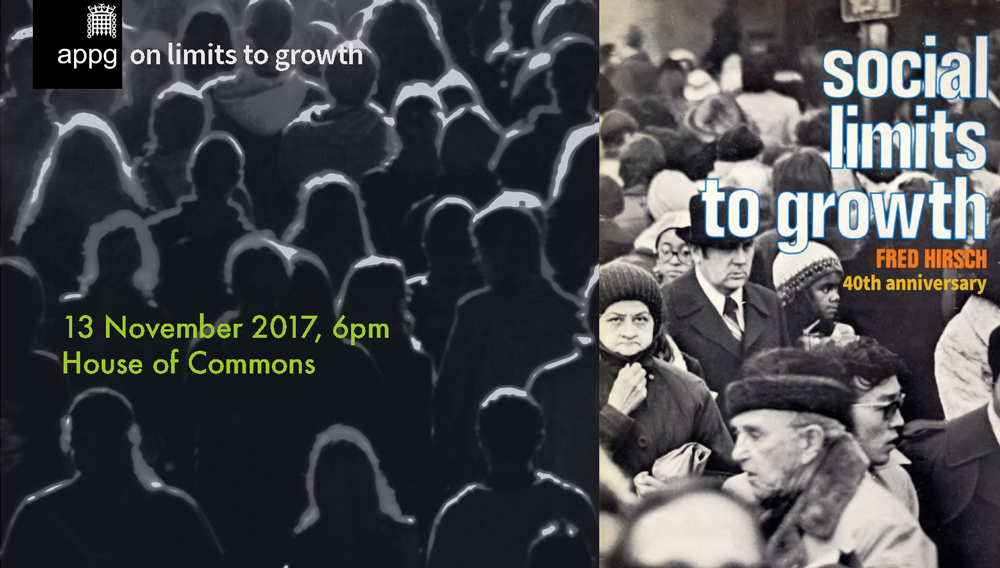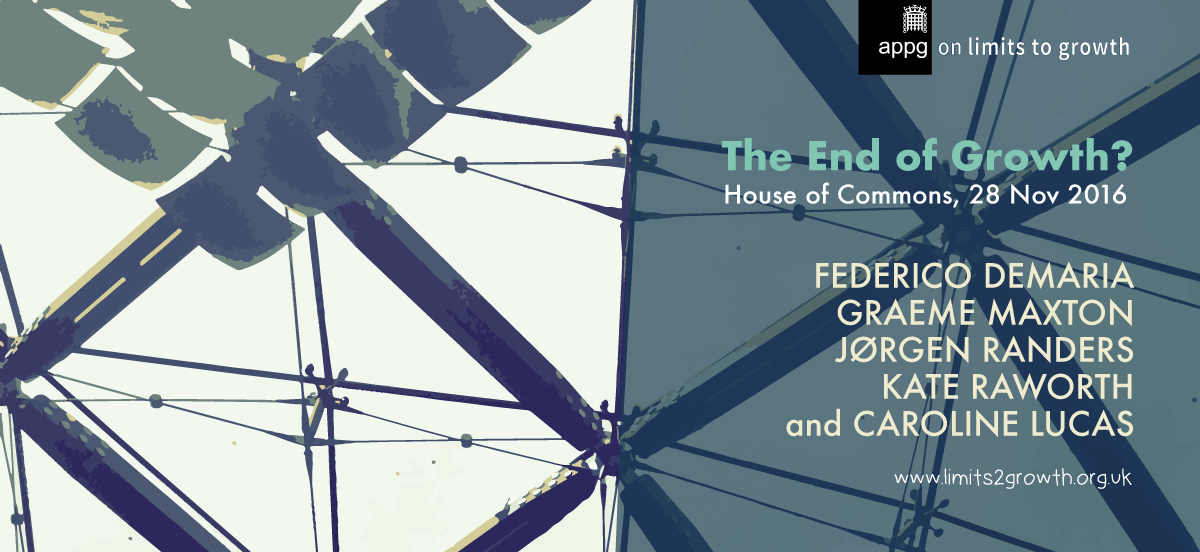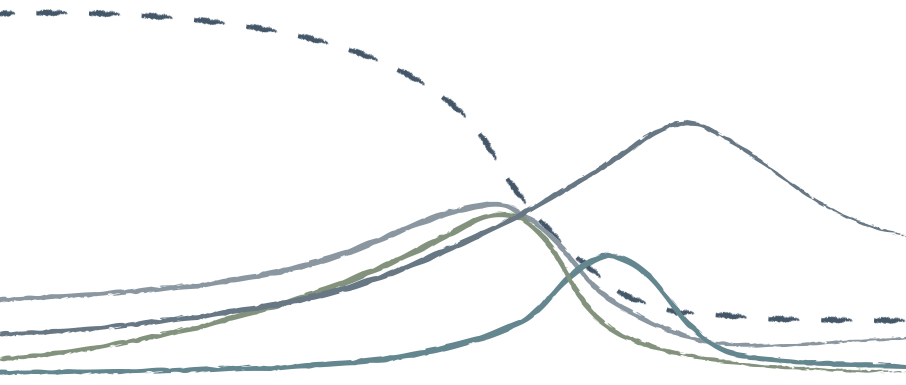Annual General Meeting and Breakfast Briefing, 26 Feb 2020
Following the 2019 general election, the APPG on Limits to Growth held its Reconstitution and Annual General Meeting on 26 February 2020, 9am in Portcullis House; accompanied by a policy workshop on the Wellbeing Economy.
Proposals for a sustainable and inclusive wellbeing economy | Early Day Motion #196
APPG chair Caroline Lucas MP tabling EDM—calling on the House of Commons to welcome the formal opinion on a sustainable and inclusive wellbeing economy, adopted by the European Economic and Social Committee on 24 January 2020; and on HM Treasury in particular to at least match the ambition and leadership shown by the EESC.
Towards a Wellbeing Economy | EESC calls for a new vision of prosperity
The European Economic and Social Committee overwhelmingly adopted a position paper on the sustainable and inclusive ‘wellbeing economy’ that Europe needs. A call on the EU ‘for a new vision of prosperity’, highlighting that building the wellbeing economy must start by adopting ‘a precautionary approach in which social stability does not depend on GDP growth’ and proposed the development of new indicators of economic performance and social progress.
Is growth an illusion? | Deutsche Bank hosting event programme at #wef2020 in Davos to discuss the post-growth challenge
Under the title Is Growth an Illusion?, Deutsche Bank hosted an event programme in Davos, accompanying the annual meeting of the World Economic Forum; to discuss the future of growth with leading politicians and internationally renowned experts from various fields. CUSP director Tim Jackson joined Deutsche US Chief Executive Christiana Riley and co-panellist Andrew McAfee.
Caroline Lucas MP and Lord Bird join forces to give a voice to Future Generations
APPG members Lord Bird and Caroline Lucas MP launching campaign—Today for Tomorrow—to call for new legislation that tackles short-term thinking, and focuses on Britain’s well-being.
Decarbonisation and Economic Strategy Bill—Towards a Green New Deal for the UK
APPG chairs Caroline Lucas MP and Clive Lewis MP launching full version of a Green New Deal bill, which sets out a transformative programme driven by the principles of justice and equity.
Climate, Nature and Growth | Early Day Motion #2382
APPG chair Caroline Lucas tabling EDM, calling on Govt to show leadership in acknowledging and developing alternatives to consumption-based economics.
Debate: Economic Growth and Environmental Limits—Caroline Lucas challenging HM Treasury in parliament, 10 July 2019
Caroline Lucas, co-chair of the APPG on Limits to Growth has secured a debate to challenge HM Treasury over the inherent tension between our current economic model—dependent on relentless economic growth—and environmental limits.
Rethinking Economic Policy in the EU | First Post-Growth Conference hosted at EU parliament
Scientists, politicians, and policymakers gathering in Brussels for landmark conference: Hosted at the EU parliament, the multi-stakeholder event is exploring visions and solutions for a post-growth economy in Europe.
Global Strategic Trends Review | Ministry of Defence taking note of the Post-Growth Challenge
On 15 October, the UK Ministry of Defence’s think tank, the Development Concepts and Doctrine Centre, published its sixth Global Strategic Trends report. ‘The Future Starts Today’ draws on a range of analysis across academia, business, government departments and nations from across the globe, including commissioned research by our research partners CUSP.
Beyond Redistribution—Confronting inequality in an era of low growth | Briefing Paper
The second in our series of briefing papers on building An Economy That Works explores inequality in the UK. It examines the evidence for rising inequality over the last fifty years, estimates the economic welfare lost to society from an unequal distribution of incomes and addresses the critical question of managing inequality in the context of declining growth rates.
Understanding the ‘New Normal’—The Challenge of Secular Stagnation | Briefing Paper
This first in our series of briefing papers on building An Economy That Works explores the underlying phenomenon of ‘secular stagnation’—a long-term decline in the rate of growth of the Gross Domestic Product (GDP). The paper examines the evidence, explores the causes and discusses the implications of what some now call the ‘new normal’.
Understanding, Safeguarding and Strengthening the Precautionary Principle | Briefing Paper
Uncertainties over which EU environmentally-related policies are likely to be culled in the process and aftermath of the ‘Great Repeal Bill’ should be cause for concern regarding the long term health of both humans and the ecosystems on which we all depend. The Precautionary Principle offers a comprehensive defence against policies which favour ‘growth’ at the cost of potentially irreversible or catastrophic risk.
Social Limits to Growth—Implications for Sustainable Prosperity
In Autumn 2017, CUSP and the APPG on Limits to Growth hosted a debate to mark the 40th Anniversary of Fred Hirsch’s ‘The Social Limits to Growth’. In 1977 Fred Hirsch’s acclaimed book made the case that in addition to the ecological limits to economic expansion...
Spring Budget 2017 | Response by the APPG on Limits to Growth
Budgets are routinely analysed by people who believe there is nothing problematic about economic growth. Forecast rates of GDP growth play a key role in the Budget calculations, and Budgets are praised or criticised based on the e ect they are deemed to have on future growth. In our view, such analysis misses a critical aspect of the contemporary debate: namely the prospect that there may be environmental, social and secular limits to economic growth.
The end of growth? | Evening debate with Kate Raworth, Jørgen Randers and Federico Demaria
On Monday the 28th November 2016 we hosted Jørgen Randers, Kate Raworth, Federico Demaria and Graeme Maxton for an evening debate at the House of Commons, chaired by Caroline Lucas MP and Tim Jackson.
Limits to Growth or Opportunities for Prosperity? | APPG Launch Event with Anders Wijkman
On 19th April 2016, we held our inaugural event Limits to Growth or Opportunities for Prosperity? at the House of Commons, with Co-Chair of the Club of Rome, Anders Wijkman, as our keynote speaker. The event also marked the launch of Limits Revisited – a new review of the limits debate commissioned specifically for the APPG.
Limits Revisited: A Review of the Limits to Growth Debate | Report
Four and a half decades after the Club of Rome published its landmark report on Limits to Growth, the study remains critical to our understanding of economic prosperity. This new review of the Limits debate outlines the contents of the Club of Rome’s report, traces the history of responses to it and dispels some of the myths surrounding it. One of the most important lessons from the study is that early responses are absolutely vital as limits are approached.
